



Sab kuch hona bacha rahega, chaar phool hain aur duniya hai (Everything will remain, there are four flowers and there is the world). Vinod Kumar Shukla’s words have now made themselves into a little film, that unspools in the dialogic, on the pathbreaking Hindi writer and poet.
Sunlight sneaks in through the apertures between the leaves of a mango tree to form thought bubbles on the wall of a house with white champa (frangipani) flowers. A moving man and his shadow interpolate this interplay, between nature and concrete, between movement and stillness, to bring into focus the subject.
If the late Indian New Wave filmmaker Mani Kaul turned Shukla’s debut novel Naukar ki Kameez/The Servant’s Shirt (1979) into an eponymous film in 1999, young filmmaker Achal Mishra shadows a contemporary writer Manav Kaul — the two Kauls aren’t related — for a rendezvous with Shukla. As Manav canvasses Shukla, Mishra’s lens stays close, like a keen listener, neither a distant fly on the wall nor thrusting the camera into the face of the subjects. Out comes a mid-length (54-minute) essay of a film, shot over two august noons in 2022. A moving portrait, Chaar Phool Hain aur Duniya Hai offers glimpses of inquiry into Shukla’s creative process, poetry of the mundane and a meditation on the art of writing. The film has released on the streaming platform MUBI, which exists to bring to us our own homegrown independent gems ignored by a for-profit-commercial OTT-saturated-world.
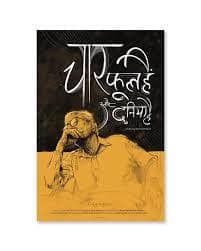 The film poster designed by Khwaab Tanha Collective.
The film poster designed by Khwaab Tanha Collective.
ALSO READ: The rise of Darbhanga wave: Three filmmakers, stories of home and Bihari cinema
ALSO READ: Hindi writer Vinod Shukla wins 2023 PEN/Nabokov lifetime achievement award
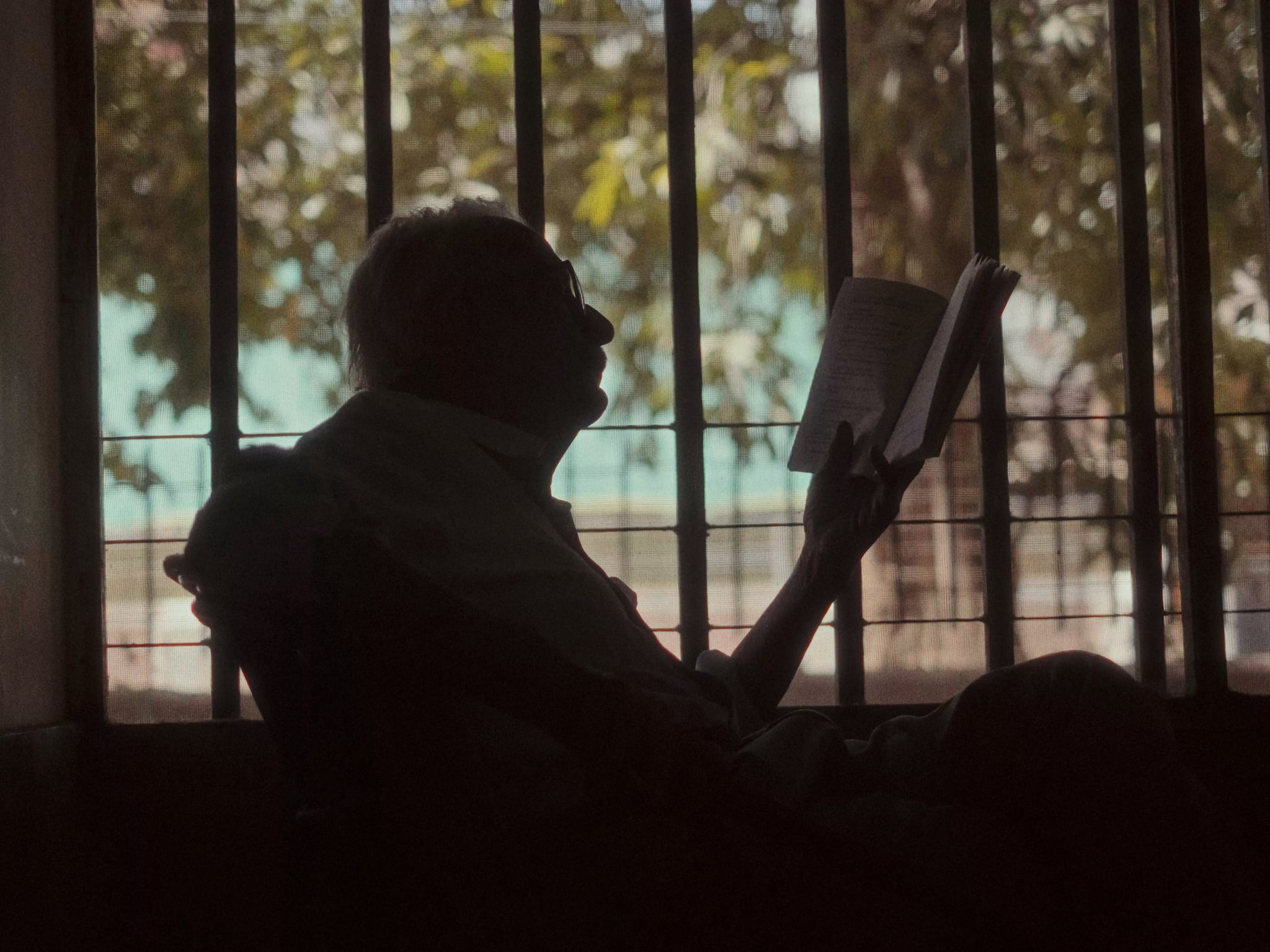 A still from the film.
A still from the film.
The pink frangipani flower logo of Mishra’s indie production house Achalchitra finds its right of place in the veranda of Shukla’s Raipur house. In Shukla’s award-winning collection of essays Blue is like Blue, Arvind Krishna Mehrotra and Sara Rai translate Shukla’s Old Veranda: “The old veranda of our house in Rajnandgaon [where Shukla was born] is now in the house in Raipur. The pole star in Raipur is the same pole star that was in Rajnandgaon. Because there is the sky and the pole star, the homeless do not feel that they are homeless but that they live in the same one place under the same sky, which is the same everywhere. Even as a little boy in Rajnandgaon, I would think about the universe. However much you may learn about it afterwards, you never forget those early associations.”
In Shukla’s strangely familiar worlds, there’s a lot of goings and comings. Home and the world. The world at his home. Homecoming and the extraordinary in the quotidian. The universal in the local. Home appears to be the starting and end point of the universe both Mishra and Shukla explore. Like in Naukar ki Kameez, the protagonist government-clerk Santu Babu says, “Ghar bahar jaane ke liye utna nahin hota jitna lautne ke liye. Kitna sukh hai ki har baar ghar lautkar aane ke liye, baar baar ghar se bahar niklunga (Home is not for leaving it as much as it is for making a return to it. There’s a world of happiness in stepping out, again and again, so that I can return home every time).” Mishra’s Maithili film debut, titled Gamak Ghar, which had also released on MUBI in 2020, observes an ancestral house and its residents over a long period of time, and different seasons, set in three time periods, shot in three aspect ratios. His film is seen, at first, from a 10-year-old’s perspective. Mishra grew up in Darbhanga and would visit his grandmother’s Madhopur house for family events. The film unfolds like an old family photo album which is brought out during get-togethers. Then, unlike the alienation and gentle despair of the protagonist in Dhuin, restless to leave his home to follow his dream, but dreams must surrender to duty, Shukla’s world is in the home — his own and of his characters, who are an extension of the writer’s self.
 Independent filmmaker Achal Mishra.
Independent filmmaker Achal Mishra.
In Mishra’s Gamak Ghar, the camera eavesdrops on a real family as it goes about its day. His third film Rii, on Ladakh, is gorgeously mounted but lacks intent, of what it wants to say. He more than makes up for that in his fourth outing. Mishra’s four films is a kind of a creative homecoming. A lost ancestral home and a bygone way of life (Gamak Ghar), a desire to leave home in pursuit of dreams but being emotionally fettered (Dhuin), seeking the unknown in distant lands (Rii), returning to the world of a familiar home (Chaar Phool Hain aur Duniya Hai). It is, what Shukla tells Manav Kaul in the film: “All of a writer’s writing is one creation, he doesn’t write anything else. Whether these are novels, poems, stories, the formats might be different but the writing is borne out of one life.” Might sound like blasphemy to some writers, that a short story can be expanded into a novel, or a short film into a full-length feature. The myriad formats then become the many angles, the many points of entry, the many ways of seeing the same story.
Mishra’s unobtrusive technique: static camera shots, at a remove from the action, is brought to the Vinod Kumar Shukla film, too. Mishra places his camera at a distance, Kaul and Shukla, when engaged in a conversation, face each other, not to the camera, which is Yasujiro Ozu-like always placed at the subject’s eye level. In one seen, the two are seated at a study table, with their backs to the camera. When the camera goes close to Shukla, he is never looking or talking straight into it. The frame is a boxy 4:3. We are hemmed in, in and by the house, the world and the mind of a writer nonpareil. The device of making a younger Hindi writer speak to the older one is a satisfying watch. Another Hindi writer, Nihal Parashar, is the executive producer on the film. Manav Kaul, also a stage and film actor and theatre director, is revealed to the audiences halfway through the film, until then one presumes that Mishra — director, cinematographer, editor, producer — is asking the questions.
To read Shukla is to be reminded of Walt Whitman, and his poem O Me! O Life! (1855). Whitman’s poetry is equally sparse but emotional. Shukla’s life’s pursuit can be described in Whitman’s words: “That you are here — that life exists and identity,/That the powerful play goes on, and you may contribute a verse.” Mishra’s film on Shukla is such a verse.
Shukla’s writing stands on word usage and unique syntax. His words might seem impenetrable to many a reader and, yet, to quote another Indian author Amitabha Bagchi, “Shukla whittles reality down to its bare poetic core.” Shukla’s economy of words, mark a passage of time, leaving us with the experience of an idea or feeling hitherto unthought-of. Rescuing thoughts and words from wordiness and cultural and linguistic posturing.
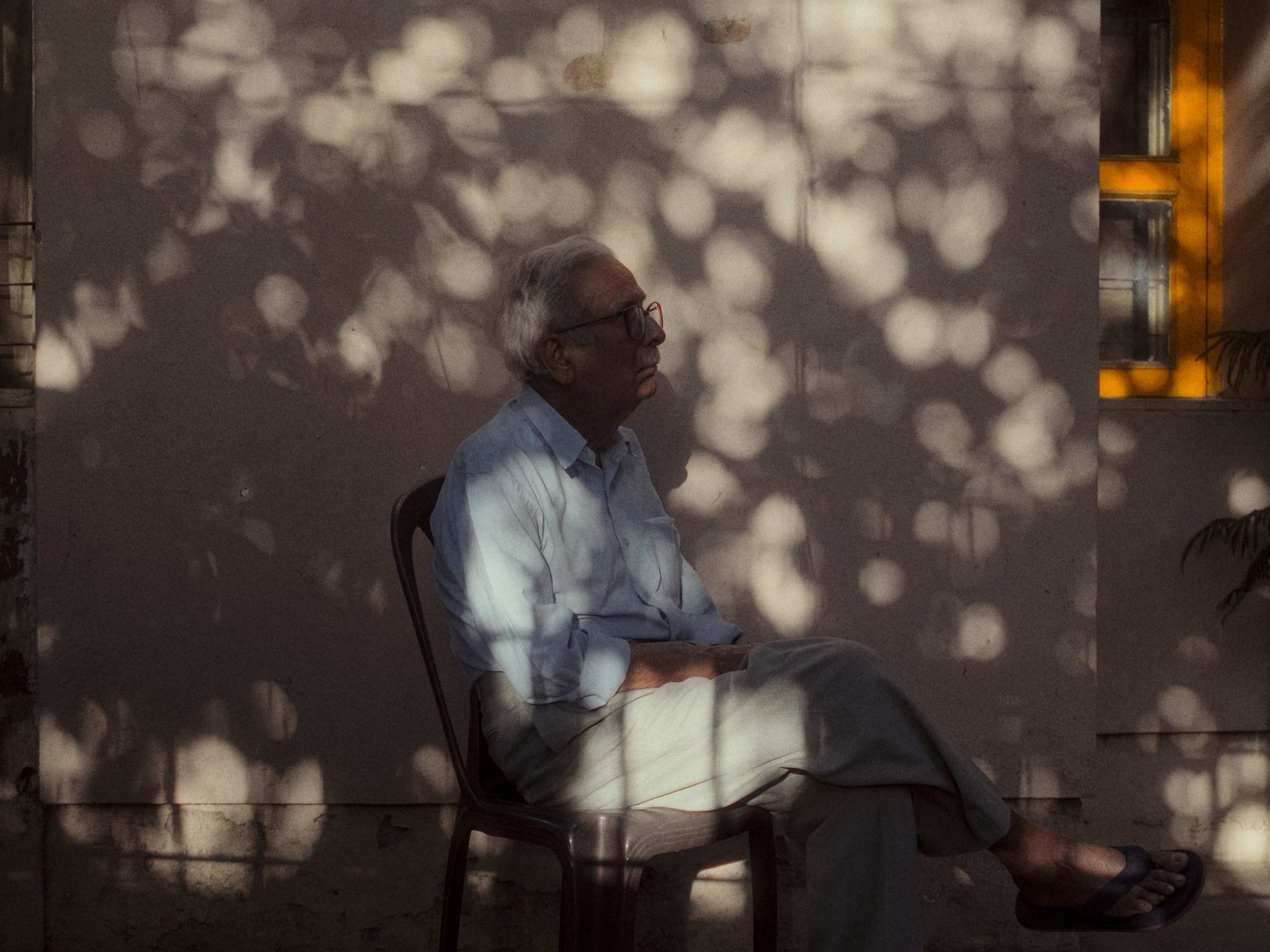 Vinod Kumar Shukla in a still from the film.
Vinod Kumar Shukla in a still from the film.
Through similes, metaphors and synecdoche, Shukla induces the evocative in the mundane. Think of the line: Woh aadmi naya garam coat pehenke chala gaya vichaar ki tarah (The man put on a new winter coat and walked off like a thought). In Shukla’s hands, thoughts shielded in words and characters — unassuming and intense — have a mind of their own, much like the disembodied nose in Nikolai Gogol’s The Nose (1836). Mehrotra and Rai note, in their translation, that by discordance — through repetitions — Shukla reveals thoughts hidden behind other thoughts and hidden sides to his characters, who can be unpredictable, doing exactly the opposite of what we expect of them.
Strange things happen in Shukla’s fiction, but also in real life: like a son inherits his father’s dentures in Shukla’s fiction, and in real life, a father’s hesitance and forgetfulness become his son’s inheritance, says Shukla’s son Shashwat Gopal in Mishra’s documentary. There are comfortable pauses between the utterances, filling in the silences is an ingenious sound design by Rohan Deep Saxena: the chirping of birds, slow footsteps, calls of vegetable vendors, rustling of leaves in the wind, Hindu chants and bell sounds, ringing mobile phones, construction sounds — all of which signal a world in motion.
In a captivating shot, we see an older Shukla supplanted by his son Gopal in the same cane chair, as mirror reflections of each other, one a little more bent than the other. Everything else remains as they are. Gopal speaks of how his father, whom he lovingly calls Dada, still writes everyday and makes his family hear his writing first. Chaar Phool Hain aur Duniya Hai is as much a journey into a writer’s mind as it is a benign father and son story, a gentle parenting story. It is an antidote to all the angry and traumatised father-son narratives that mainstream cinema feeds us with. The writer’s wife, Sudha Shukla, is not forgotten. Seen as a nurturer-provider in real and an inspiration feeding the imagining of female characters Shukla sketched in his stories, like that of the wife in Naukar ki Kameez — in Mani Kaul’s film, the role was played by Anu Joseph, who stayed with Shukla and his wife to get into the skin of her character.
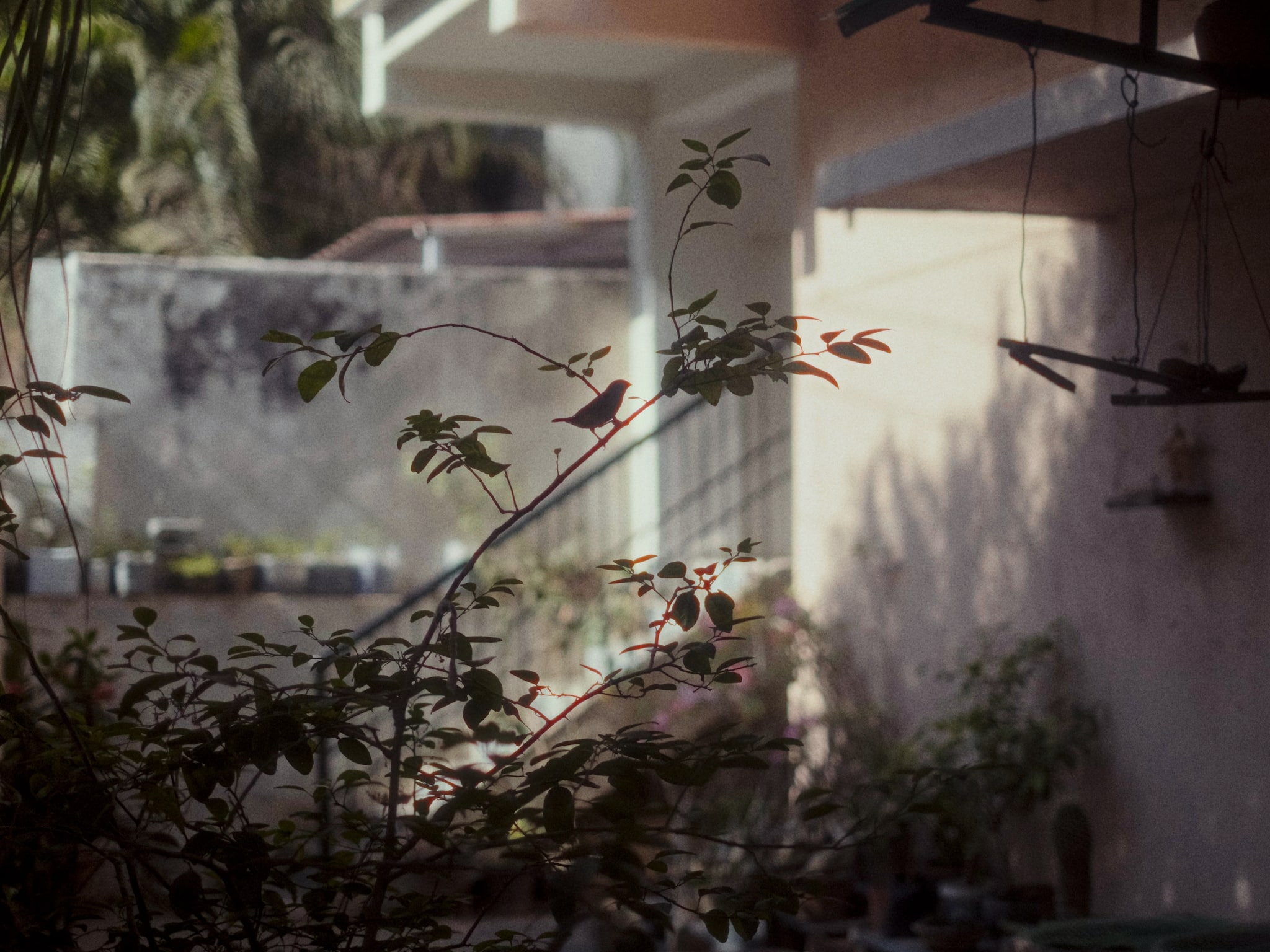 A still from the film.
A still from the film.
In Mishra’s documentary, Shukla words remind of Satyajit Ray’s early cinema, its humanism and universalism, and the emotional substrate springing from the dailiness or undramatic aspects of life: “the more local you are the more universal you will be. That one must preserve their localism as much as possible. The life one has lived, the childlikeness, the geography of their childhood. One should keep returning to it, keep remembering it.” It should be a deliberate act, like Milan Kundera wrote, “The struggle of man against power is the struggle of memory against forgetting.” Remembrances help any kind of effacement. Shukla says in the documentary, when he forgets and eventually remembers what he’s forgotten, he feels full of life.
 Shashwat Gopal in a still from the film.
Shashwat Gopal in a still from the film.
Shukla’s vivid visual imagery owes its genesis to the world of cinema, for he, who didn’t read the works of a lot of writers, grew up watching films at a local theatre. Mishra’s love letter to Shukla is a befitting tribute. Mishra eschews any biopic-like approach, or forced larger social or political contemplation. No probing on what kind of effect the politics of Marxist poet-essayist Gajanan Madhav Muktibodh, whose works inspired Mani Kaul to make Satah Se Uthata Aadmi, 1980, and who egged a young Shukla to take to writing, had on Vinod Kumar Shukla. No questions on why Shukla didn’t address Naxalism despite living in the Naxal belt. No mention of Shukla’s fights with his publishers (Vani Prakashan and Rajkamal Prakashan) for royalty, that unfolded around the same time when camera-bearing Mishra went to Shukla’s home. Mishra’s film is not that. Why must an artist — a writer, a filmmaker — create to cater to what the readers/audiences expect. If you are supplying to a demand, you are no longer a creator of an original thought. Originality of thought is sometimes a boon of forgetfulness, Gopal says in the film. Mishra, instead, captures the in-between moments in the life of a writer.
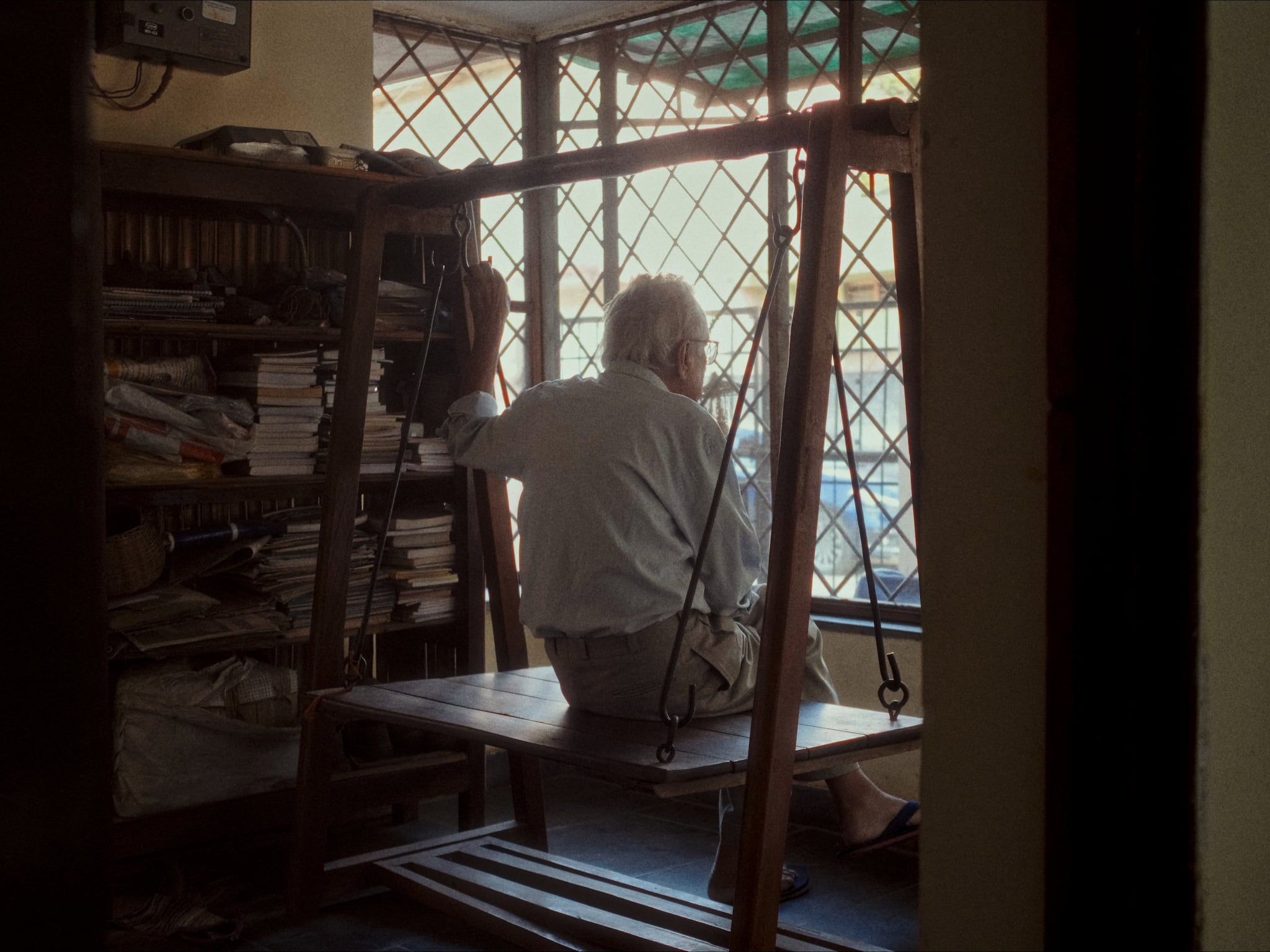 A still from the film.
A still from the film.
Criticism is something Shukla doesn’t respond to, he tells Manav Kaul in the film. Shukla felt bad when Mani Kaul’s film on his story was compared and criticised. A film and the literary work it is adapted from must never be compared, the writer espouses. “The criticism of the written can only be given through the written, to keep writing and nothing else,” Shukla says in the film. The profound lies in his singular sentences: “Every person should think of themselves as writers of their own history. If each of us write our own histories, then there won’t be a need for any other kind of history.” Greater truth hasn’t been told in our post-truth world. That we fight, are intolerant and are gullible to believe borrowed false narratives is because each individual has not recorded their personal history. Personal makes up the political. A filmmaker, like a writer, is recording his own contemporary history.
Shukla is a gift that keeps giving. He makes the ordinary seem marvellous. And Tajdar Junaid’s redolent and transcendental music, that tug at your heart strings, rekindling memories of the restorative pause of summer afternoons, makes the marvellous appear ordinary. The balmy Chaar Phool Hain aur Duniya Hai is an essential watch for readers and non-readers alike. Here’s a slice of our literary and cultural history preserved on film. Like Shukla, Mishra is trying to swim against the tide to capture the tumult in still things. It is easy to despair, but to hope in a bleak world takes courage and sensorial wakefulness. Hope is the fount of Shukla’s writing; a strange conviviality binds his characters to their problems. Mishra’s film’s title, taken from Shukla’s poem, evinces that there is all of the world, its trials and tribulations, but there is also a handful of flowers. Smell the flowers while you can. As Shukla ruminates on forgetting and remembering, on being (alive) and not-being (becoming a photo), Mishra has frozen, for posterity, the cultural fragrance and the flowering of an intellectual life on film.
Discover the latest Business News, Sensex, and Nifty updates. Obtain Personal Finance insights, tax queries, and expert opinions on Moneycontrol or download the Moneycontrol App to stay updated!
Find the best of Al News in one place, specially curated for you every weekend.
Stay on top of the latest tech trends and biggest startup news.